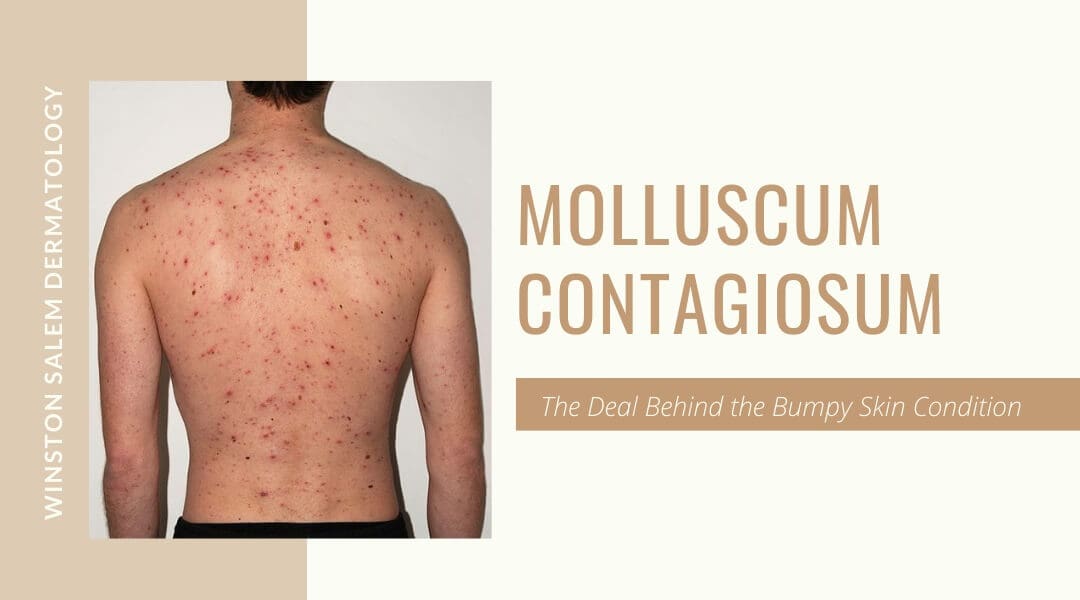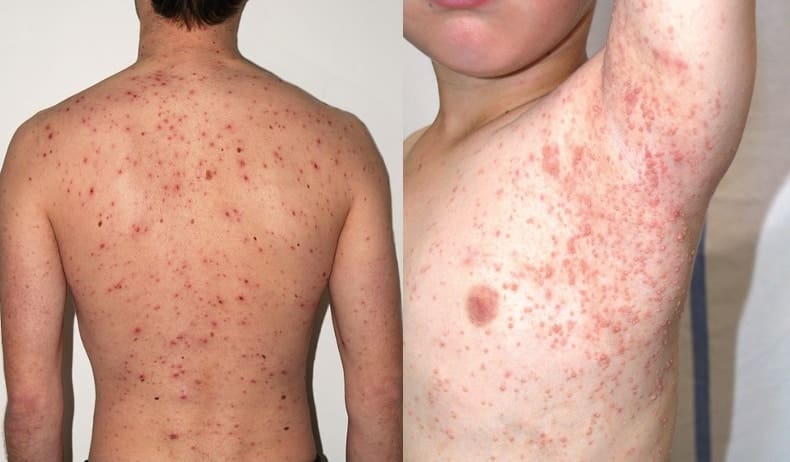
Have you noticed raised bumps on your skin? Does it seem like they spread easily? There’s a chance it could be molluscum contagiosum. These small bumps are painless, but they could be irritating and embarrassing to deal with.
If you practice a little patience, these bumps will disappear on their own without the need for any treatments or medication. However, sometimes it’s not easy to be patient when it comes to your appearance. That’s why there are molluscum contagiosum treatment options out there to help you get some relief from these annoying bumps.
What Exactly is Molluscum Contagiosum?
Molluscum contagiosum are raised bumps or lesions on the upper layers of the skin. They can appear alone, or sometimes they show up in a large patch of up to 20.
Molluscum contagiosum is considered a skin infection that is usually spread by touching something that was first touched by someone who had the virus.
Like we mentioned earlier, these bumps are usually painless, but there’s really no telling how long they will last. Often these bumps stick around for about two months, but sometimes they can even last forup to four years. But there is some good news to all of this! If you’re already in pretty good health, these bumps will most likely disappear on their own and usually don’t leave behind scars.
What Are the Molluscum Contagiosum Symptoms?
If you come into contact with someone who has the virus, you may think it didn’t spread to you because you don’t have any symptoms. Unfortunately, it could be up to six months before you see any symptoms show up. The incubation period is between two and seven weeks. So even if you don’t have any symptoms, you may not be in the clear just yet.
Here are the characteristics of the bumps that appear during molluscum contagiosum stages:
- These bumps can appear anywhere except on the palms of your hands or the soles of your feet.
- The most common areas for them to appear are on the face, abdomen, torso, arms, legs, inner thigh, genitals, and abdomen.
- In children, these bumps are most common on the face, neck, armpits, and tops of hands.
- The lesions will be very small. They are usually between 2 to 5 millimeters in diameter or between the size of the head of a pin and the size of a pencil eraser. However, if you have a weakened immune system, then these bumps could be as large as 15 millimeters in diameter.
- The bumps are shiny and smooth.
- The bumps are also shaped like a dome with a dent or dimple in the middle.
- The core is made of waxy material.
- The lesions can easily be removed if they are scratched, but then they spread to the adjacent area.
What Causes Molluscum Contagiosum in Adults and Children?
There are different ways to get this infection, but the common links are touching someone that has the virus or touching something that they have also touched.
This infection is most common in children, but it can also affect adults. Most of the time, the virus is usually transmitted through children just through normal play. It can also happen when they share toys or other items that have been touched.

Teens and adults can get the virus from sexual contact or by sharing things that are contaminated, like towels or sports equipment.
Some Groups Are at a Higher Risk for Molluscum Contagiosum
Anyone can get molluscum contagiosum, but there are certain groups that are more likely to be infected.
- Those that have a weakened immune system
- Children between the ages of 1 and 10
- People who have atopic dermatitis or another skin condition
- Those that participate in contact sports like wrestling or football where it is skin-to-skin contact and equipment is shared
How is Molluscum Contagiosum Diagnosed, and When is it Treated?
As we said earlier, you don’t have to get treatment if you have molluscum contagiosum. But if you have had the bumps for more than a few days, then you may want to go to a doctor and get the condition confirmed. A skin scraping or a biopsy can help determine if you have the virus.
If you have a healthy immune system, these bumps will go away within a year without any need for treatment. However, there are some cases where you may need medical attention.
Here are the most common reasons for treating molluscum contagiosum:
- The lesions are very large in size and are on places that make you self-conscious, like on your face or neck.
- If you have an existing skin disease like atopic dermatitis.
- If you are worried about the virus easily spreading.
In some cases, there could be complications that come with the virus. For instance, the skin around the bumps could become red and inflamed, or infected. You can even get these bumps on your eyelids which can lead to pink eye. These are some other reasons when you may want to go see a doctor if the bumps lead to too many problems.
What Are the Treatment Options for Molluscum Contagiosum?
If you are a candidate for getting treatment for your molluscum contagiosum, there are several different options that are available.
-
Cryotherapy
During this treatment, the doctor will freeze off each bump with liquid nitrogen.
-
Curettage
The doctor will pierce the bump and scrape it off with a small tool.
-
Laser Therapy
The doctor will use a laser to destroy each bump.
-
Topical Therapy
Special creams will be added to the bumps to help peel off the top layers of the skin.
How Can I Prevent Molluscum Contagiosum?
Molluscum Contagiosum is pretty easy to spread because sometimes it’s hard to avoid contact with people, or maybe you have to share sporting equipment. While it may be hard to stay away from the condition, there are ways that you can help prevent it.
- Wash your hands.
- Avoid touching the bumps, which could cause this to spread.
- Avoid shaving over the bumps because this could cause the bumps to spread to other areas of the body.
- Don’t share personal items like towels or clothing.
- Avoid sexual contact if you have molluscum contagiosum near your genitals.
- Keep the bumps covered to prevent any accidental skin-to-skin contact with someone else. You can keep them covered with clothing or band-aids.
Fed Up with Molluscum Contagiosum? Let us Help!
Are you tired of looking in the mirror and seeing those irritating bumps? There are treatment options out there that will help you look and feel your absolute best again. At Winston Salem Dermatology, we specialize in all areas of skincare. We believe that there’s no better time than now to invest in taking care of your skin. No matter your age, we can help you enjoy a lifetime of beautiful and healthy skin. Don’t wait! Call us today at (336) 774-8636 to find out about our products and services that will give you the perfect skin you’ve been dreaming about.

